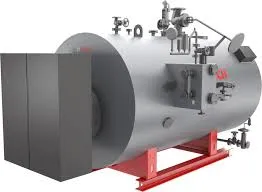
डिस . 06, 2024 02:40 Back to list
what are the 3 types of boilers
Understanding the Three Types of Boilers
Boilers are essential devices used in various industries and home heating systems, providing hot water or steam through a process of combustion and heat exchange. They can be categorized into three main types based on their design and operation fire-tube boilers, water-tube boilers, and electric boilers. Each type has unique characteristics and applications, making them suitable for different purposes.
Fire-tube boilers are one of the most common types of boilers used in various settings. In these boilers, hot gases produced during combustion pass through tubes that are surrounded by water. The heat from the gases is transferred to the water, creating steam or hot water. Fire-tube boilers are known for their simple design and ease of operation.
One of the primary advantages of fire-tube boilers is their efficiency. They can quickly generate steam and are capable of handling high-pressure needs. However, they are generally limited in the amount of steam they can produce compared to water-tube boilers. Fire-tube boilers are often used in smaller industrial applications and residential heating systems. Common examples include residential hot water heaters and smaller industrial steam generators.
2. Water-Tube Boilers
Water-tube boilers differ significantly from fire-tube boilers in their design and operation. In these systems, water flows through tubes that are surrounded by hot gases. This design allows for a much more efficient heat exchange process, producing steam at higher pressures and temperatures. Water-tube boilers are typically used in larger industrial settings and power plants where high-efficiency steam generation is necessary.
what are the 3 types of boilers

One of the main advantages of water-tube boilers is their ability to generate steam quickly and at high pressure. They can also handle fluctuations in demand more effectively than fire-tube boilers. This makes them ideal for applications such as generating electricity in power plants or providing steam for large industrial processes. However, they are more complex and may require more maintenance compared to fire-tube boilers.
3. Electric Boilers
Electric boilers are another type that has gained popularity, particularly in areas where the availability of fossil fuels is limited. These boilers utilize electricity to heat water and generate steam. They are known for their efficiency, as they do not produce emissions associated with combustion.
The primary advantage of electric boilers is their ability to operate quietly and with minimal environmental impact. They are ideal for smaller applications, such as commercial buildings and residential heating. However, electric boilers may have higher operating costs, depending on the price of electricity in the local area. They are also limited in their capacity to generate steam compared to the other types of boilers.
Conclusion
In summary, the three main types of boilers—fire-tube, water-tube, and electric—each have their unique attributes and applications. Fire-tube boilers are favored for simplicity and ease of use, making them suitable for smaller scale applications. Water-tube boilers are ideal for high-demand industrial settings, designed to handle larger volumes of steam at elevated pressures. Electric boilers provide an eco-friendly option with quiet operation and minimal emissions, although they may come with higher operational costs.
When selecting a boiler, it is crucial to consider factors such as efficiency, available fuel sources, space, and specific heating needs. Understanding the differences between these types of boilers can help individuals and businesses make informed decisions that ultimately lead to cost-effectiveness and sustainability in their heating solutions. Whether for industrial purposes or residential heating, choosing the right boiler type can significantly impact performance and operational efficiency.
-
How to Maintain a Steam Boiler Expert Tips for Efficiency & Longevity
NewsApr.29,2025
-
Professional Steam Boiler Service AB Expert Maintenance & Repair
NewsApr.29,2025
-
Hot Water Steam Boilers Efficient Heating Solutions & Expert Tips
NewsApr.29,2025
-
Hot Water Boiler Capacity Calculation Guide Efficient Design Tips
NewsApr.28,2025
-
How to Drain a Steam Boiler Step-by-Step Safety Guide
NewsApr.28,2025
-
How to Install a Hot Water Boiler Optimal Pressure & Efficiency Guide
NewsApr.28,2025
Related PRODUCTS






















